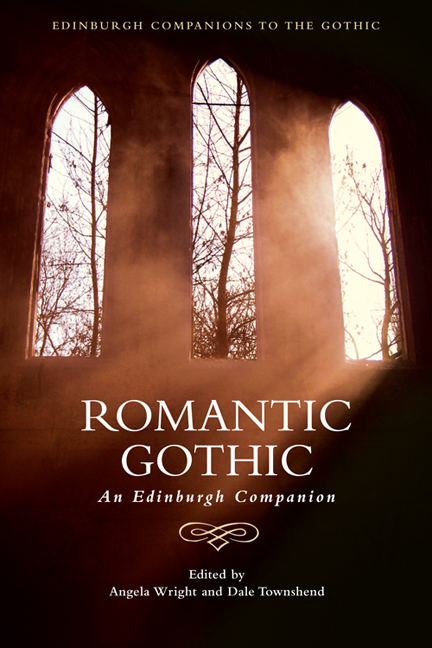Book contents
- Frontmatter
- Contents
- 1 Gothic and Romantic: An Historical Overview
- Part I Gothic Modes and Forms
- 2 Graveyard Writing and the Rise of the Gothic
- 3 Gothic Romance
- 4 The Gothic Stage: Visions of Instability, Performances of Anxiety
- 5 Gothic Poetry and First-Generation Romanticism
- 6 Gothic and Second-Generation Romanticism: Lord Byron, P. B. Shelley, John Polidori and Mary Shelley
- 7 Political Gothic Fiction
- 8 Shorter Gothic Fictions: Ballads and Chapbooks, Tales and Fragments
- 9 Oriental Gothic
- 10 Gothic Parody
- Part II National and International Borders
- Part III Reading the Romantic Gothic
- Notes on Contributors
- Index
7 - Political Gothic Fiction
from Part I - Gothic Modes and Forms
Published online by Cambridge University Press: 05 August 2016
- Frontmatter
- Contents
- 1 Gothic and Romantic: An Historical Overview
- Part I Gothic Modes and Forms
- 2 Graveyard Writing and the Rise of the Gothic
- 3 Gothic Romance
- 4 The Gothic Stage: Visions of Instability, Performances of Anxiety
- 5 Gothic Poetry and First-Generation Romanticism
- 6 Gothic and Second-Generation Romanticism: Lord Byron, P. B. Shelley, John Polidori and Mary Shelley
- 7 Political Gothic Fiction
- 8 Shorter Gothic Fictions: Ballads and Chapbooks, Tales and Fragments
- 9 Oriental Gothic
- 10 Gothic Parody
- Part II National and International Borders
- Part III Reading the Romantic Gothic
- Notes on Contributors
- Index
Summary
In writing about Political Gothic fiction in the Romantic period two vexed questions confront us. First, in what sense is any Gothic fiction of the period political? Secondly, what is the difference between political Gothic fiction and the Jacobin novel? The essayist and critic William Hazlitt famously commented that Ann Radcliffe's romances ‘derived part of their interest, no doubt, from the supposed tottering state of all old structures at the time’ (Hazlitt 1907: 73). With his dissenting background Hazlitt understood this interest to be political (Paulin 1999); the ‘tottering of old structures’ clearly signalled the present Revolutionary age, and readers were thrilled with either eagerness or horror at the idea, depending on their political outlook. The connection between the Gothic and Revolution was reinforced by the Marquis de Sade, who claimed that Radcliffe's and Lewis's novels were ‘the necessary fruits of the revolutionary tremors felt by the whole of Europe’ (De Sade 1990: 49). This general connection creates the problem: if all Gothic novels refract ‘representations of Revolution’ (Paulson 1983), then no Gothic novels are political. Or rather, politics here is no more specific than it is in David Punter's seminal discussion of Marx and Freud in his concluding chapter to the The Literature of Terror (1980), in which the Gothic is read as a kind of dystopic imagining in the grim shadow of a new, capitalist Oedipus (Punter 1980). But that, clearly, is not what is understood by the phrase ‘political Gothic fiction’. The phrase suggests that there is a particular strand of Gothic fiction that is more political than other strands. The difficulty here is that this strand already has a name – the ‘Jacobin novel’ (Kelly 1976; Bellamy 1998). More recently it has been paired with ‘Anti-Jacobin’ fiction, novels of parody and reaction, which may include a particularly conservative strand of Gothic that James Watt calls ‘Loyalist’ (Watt 1999: 2–4; Grenby 2001; Wallace 2009). A work may belong to more than one genre, and a genre may have more than one name (Cohen 1991: 88–90). Still, the question needs to be asked: is political Gothic fiction another way of referring to the Jacobin novel, and/or to its reactionary shadow, the Anti-Jacobin? If the answer is ‘yes’, then we hardly need the category of ‘political Gothic fiction’ at all.
- Type
- Chapter
- Information
- Romantic GothicAn Edinburgh Companion, pp. 129 - 146Publisher: Edinburgh University PressPrint publication year: 2015

